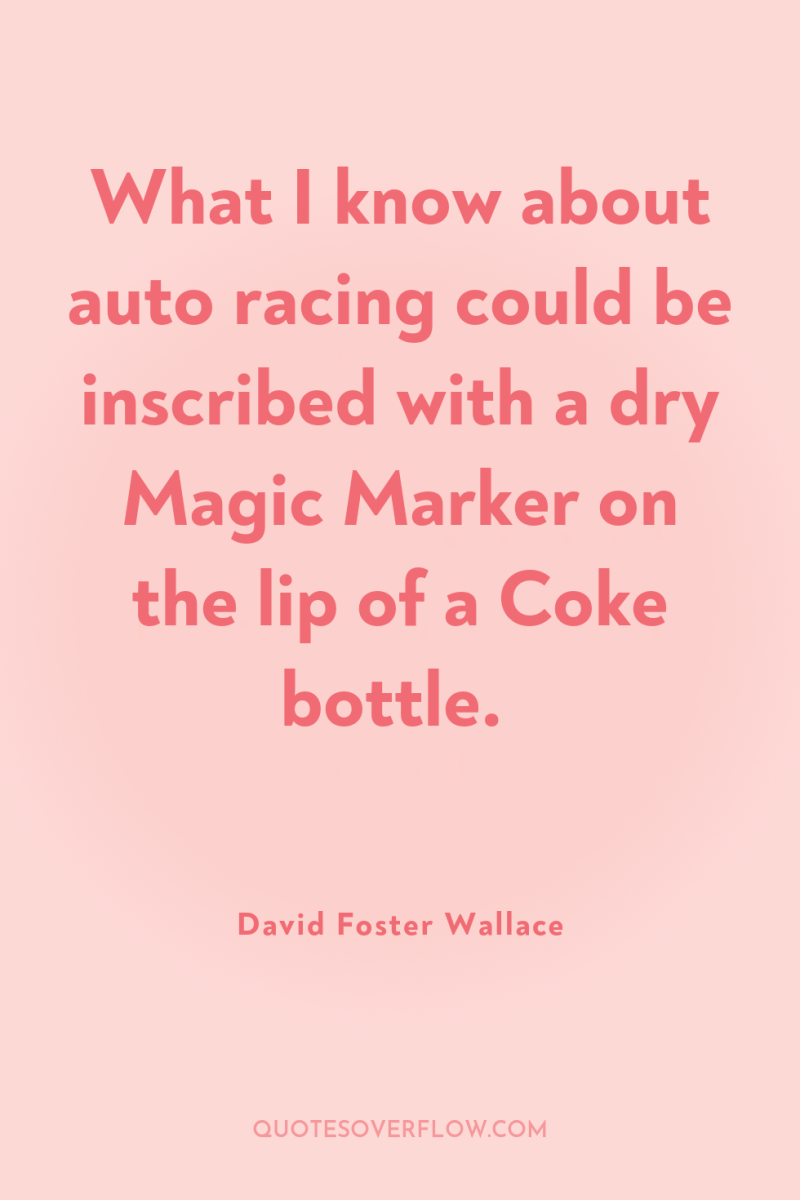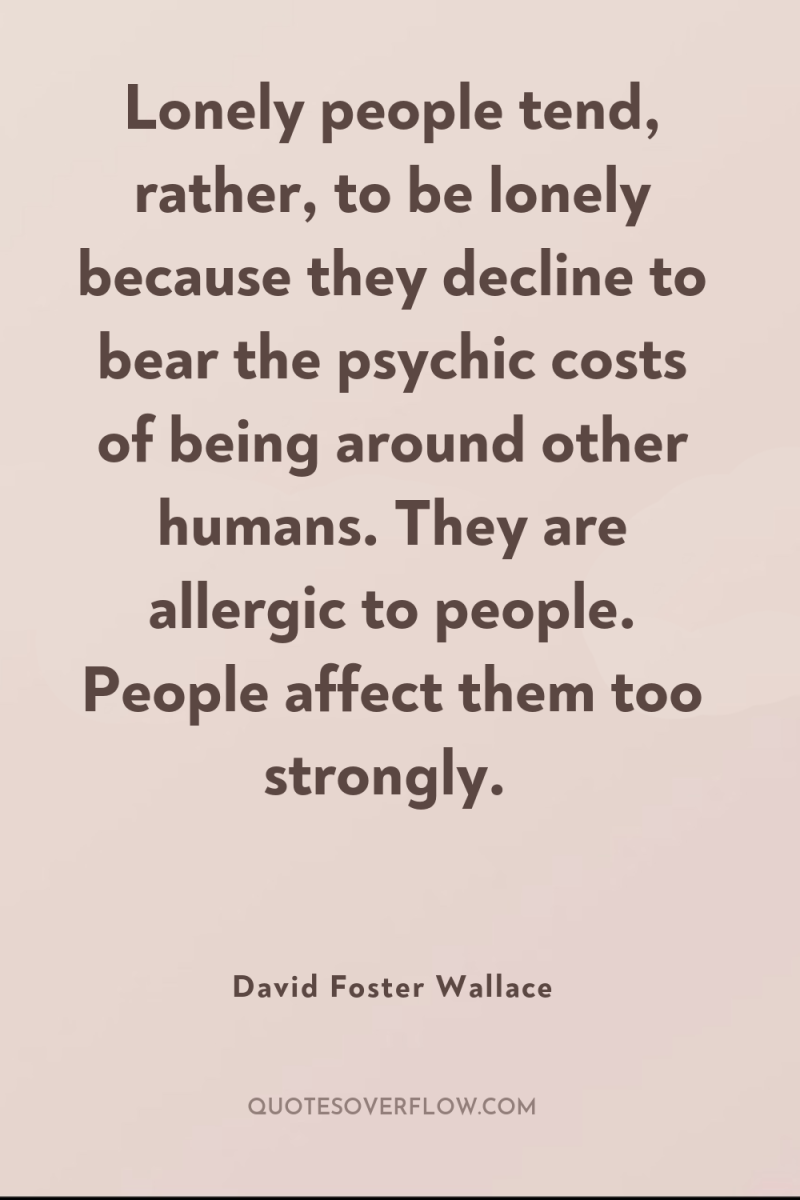1
I felt despair. The word’s overused and banalified now, despair, but it’s a serious word, and I’m using it seriously. For me it denotes a simple admixture – a weird yearning for death combined with a crushing sense of my own smallness and futility that presents as a fear of death. It’s maybe close to what people call dread or angst. But it’s not these things, quite. It’s more like wanting to die in order to escape the unbearable feeling of becoming aware that I’m small and weak and selfish and going without any doubt at all to die. It’s wanting to jump overboard. .David Foster Wallace

2
What I know about auto racing could be inscribed with a dry Magic Marker on the lip of a Coke bottle.David Foster Wallace

3
Lonely people tend, rather, to be lonely because they decline to bear the psychic costs of being around other humans. They are allergic to people. People affect them too strongly.David Foster Wallace
4
I am now 33 years old, and it feels like much time has passed and is passing faster and faster every day. Day to day I have to make all sorts of choices about what is good and important and fun, and then I have to live with the forfeiture of all the other options those choices foreclose. And I'm starting to see how as time gains momentum my choices will narrow and their foreclosures multiply exponentially until I arrive at some point on some branch of all life's sumptuous branching complexity at which I am finally locked in and stuck on one path and time speeds me through stages of stasis and atrophy and decay until I go down for the third time, all struggle for naught, drowned by time. It is dreadful. But since it's my own choices that'll lock me in, it seems unavoidable--if I want to be any kind of grownup, I have to make choices and regret foreclosures and try to live with them.David Foster Wallace
5
How can even the idea of rebellion against corporate culture stay meaningful when Chrysler Inc. advertises trucks by invoking “The Dodge Rebellion”? How is one to be bona fide iconoclast when Burger King sells onion rings with “Sometimes You Gotta Break the Rules”? How can an Image-Fiction writer hope to make people more critical of televisual culture by parodying television as a self-serving commercial enterprise when Pepsi and Subaru and FedEx parodies of self-serving commercials are already doing big business? It’s almost a history lesson: I’m starting to see just why turn-of-the-century Americans’ biggest fear was of anarchist and anarchy. For if anarchy actually wins, if rulelessness become the rule, then protest and change become not just impossible but incoherent. It’d be like casting a ballot for Stalin: you are voting for an end to all voting. .David Foster Wallace
6
AN ACADEMIC DEFINITION of Lynchian might be that the term "refers to a particular kind of irony where the very macabre and the very mundane combine in such a way as to reveal the former's perpetual containment within the latter." But like postmodern or pornographic, Lynchian is one of those Porter Stewart-type words that's ultimately definable only ostensively-i.e., we know it when we see it. Ted Bundy wasn't particularly Lynchian, but good old Jeffrey Dahmer, with his victims' various anatomies neatly separated and stored in his fridge alongside his chocolate milk and Shedd Spread, was thoroughgoingly Lynchian. A recent homicide in Boston, in which the deacon of a South Shore church reportedly gave chase to a vehicle that bad cut him off, forced the car off the road, and shot the driver with a highpowered crossbow, was borderline Lynchian. A Rotary luncheon where everybody's got a comb-over and a polyester sport coat and is eating bland Rotarian chicken and exchanging Republican platitudes with heartfelt sincerity and yet all are either amputees or neurologically damaged or both would be more Lynchian than not. .David Foster Wallace
7
I think the world divides neatly into those who are excited by the managed induction of terror and those who are not. I do not find terror exciting. I find it terrifying. One of my basic goals is to subject my nervous system to as little total terror as possible. The cruel paradox of course is that this kind of makeup usually goes hand in hand with a delicate nervous system that's extremely easy to terrify.David Foster Wallace
8
In sum, then a conservative tech writer offers a really attractive way of looking at viewer passivity and TV's institutionalization of irony, narcissism, nihilism, stasis. It's not our fault! It's outmoded technology's fault! If TV-dissemination were up to date, it would be impossible for it to "institutionalize" anything through its demonic "mass psychology"! Let's let Joe B., the little lonely guy, be his own manipulator or video-bits! Once all experience is finally reduced to marketable image, once the receiving user of user-friendly receivers can choose freely, Americanly, from an Americanly infinite variety of moving images hardly distinguishable from real-life images, and can then choose further just how he wishes to store, enhance, edit, recombine, and present those images to himself, in the privacy of his very own home and skull, TV's ironic, totalitarian grip on the American psychic cajones will be broken! " E Unibus Pluram: Television and U.S. Fiction" (The Review of Contemporary Fiction, 1993) .David Foster Wallace
9
In school I ended up writing three different papers on "The Castaway" section of Moby-Dick, the chapter where the cabin boy Pip falls overboard and is driven mad by the empty immensity of what he finds himself floating in. And when I teach school now I always teach Crane's horrific "The Open Boat, " and get all bent out of shape when the kids find the story dull or jaunty-adventurish: I want them to feel the same marrow-level dread of the oceanic I've always felt, the intuition of the sea as primordial nada, bottomless, depths inhabited by cackling tooth-studded things rising toward you at the rate a feather falls.David Foster Wallace
10
And we hate this possibility in movies; we hate this "both" shit. "Both" comes off as sloppy characterization, muddy filmmaking, lack of focus.. But I submit that the real reason we criticized and disliked Lynch's Laura's muddy bothness is that it required of us an empathetic confrontation with the exact same muddy bothness in ourselves and our intimates that makes the real world of moral selves so tense and uncomfortable, a bothness we go to the movies to get a couple hours' fucking relief from.David Foster Wallace
11
I submit that the real reason we criticized and disliked Lynch's Laura's muddy bothness is that it required of us an empathetic confrontation with the exact same muddy bothness in ourselves and our intimates that makes the real world of moral selves so tense and uncomfortable, a bothness we go to the movies to get a couple hours' fucking relief from.David Foster Wallace